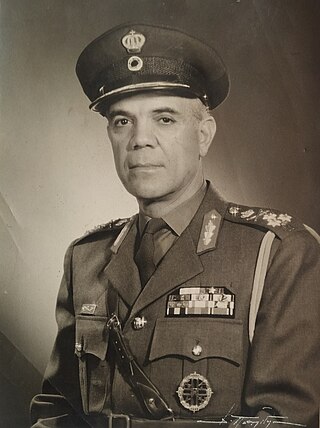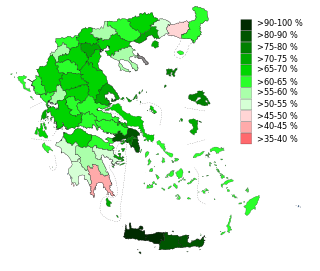
Constantine II was the last King of Greece, reigning from 6 March 1964 until the abolition of the Greek monarchy on 1 June 1973.

Georgios Papadopoulos was a Greek military officer and dictator who led a coup d'etat in Greece in 1967 and became the country's Prime Minister from 1967 to 1973. He also was the President of Greece under the junta in 1973, following a referendum. However, after the effective suppression of the Athens Polytechnic uprising, he was, in turn, overthrown by hardliner Dimitrios Ioannidis, in a string of events that would culminate to the fall of the regime in 1974. His and the dictatorship's legacy, as well as its methods he constructed and effects on Greek economy and society as a whole, are still fiercely debated.

The president of Greece, officially the President of the Hellenic Republic, commonly referred to in Greek as the President of the Republic, is the head of state of Greece. The president is elected by the Hellenic Parliament; the role has been mainly ceremonial since the 1986 constitutional reform. The office was formally established by the Constitution of Greece in 1975, but has antecedents in the Second Hellenic Republic of 1924–1935 and the Greek junta in 1973–1974 which predated the transition to the current Third Hellenic Republic. The incumbent, since 13 March 2020, is Katerina Sakellaropoulou.

Odysseus Aggelis was a Greek nationalist military officer of the Artillery [Reg. Number 19386]. He reached the rank of four star General and served as Chief of the Greek Armed Forces and Vice President of the Hellenic Republic. He supported the military regime that was established on April 21, 1967.

The Greek junta or Regime of the Colonels was a right-wing military dictatorship that ruled Greece from 1967 to 1974. On 21 April 1967, a group of colonels overthrew the caretaker government a month before scheduled elections which Georgios Papandreou's Centre Union was favoured to win.
A referendum on restoring the monarchy was held in Greece on 3 November 1935. The proposal was approved by nearly 97.9% of voters, although the conduct during the referendum is not considered to have been free or fair. George II returned from exile and was restored to the throne on 25 November 1935.

A seven-question referendum was held in Belarus on 24 November 1996. Four questions were put forward by President Alexander Lukashenko on changing the date of the country's independence day, amending the constitution, changing laws on the sale of land and the abolition of the death penalty. The Supreme Council put forward three questions on constitutional amendments by the Communist and Agrarian factions, local elections and the national finances.

The currently deposed Greek royal family was the ruling family of the Kingdom of Greece from 1863 to 1924 and again from 1935 to 1973. The family is a branch of the Danish royal family, itself a cadet branch of the House of Glücksburg. The family had replaced the House of Wittelsbach that previously ruled Greece from 1832 to 1862. The first monarch was George I of Greece, the second son of King Christian IX of Denmark. The current head of the family is Pavlos, who assumed the role on 10 January 2023 upon the death of his father, former King Constantine II.
In the modern history of Greece, starting from the Greek War of Independence, the Constitution of 1975/1986/2001 is the last in a series of democratically adopted Constitutions.

The history of the Hellenic Republic constitutes three republican periods in the modern history of Greece: from 1822 until 1832; from 1924 until 1935; and from 1974 through to the present. See also the constitutional history of Greece.

A referendum on retaining the republic was held in Greece on 8 December 1974. After the collapse of the military junta that ruled the country since 1967, the issue of the form of government remained unsolved. The Junta had already staged a referendum held on 29 July 1973, which resulted in the establishment of the Republic. However, after the fall of the military regime, the new government, under Prime Minister Constantine Karamanlis, decided to hold another one, as Junta constituent acts were considered void. Constantine II, the former king, was banned by the new government from returning to Greece to campaign in the referendum, but the Karamanlis government allowed him to make a televised address to the nation. A total of 69.2% of voters favoured retaining the republic with a turnout of 75.6%.

A constitutional referendum was held in Greece on 29 July 1973. The amendments would confirm the abolition of the monarchy by the military junta and establish a republic. The proposal was approved by 78.6% of voters with a turnout of 75%.
The Greek Constitution of 1968 was a largely unimplemented constitution of Greece promulgated in May 1968 by the military regime which had been ruling Greece since the coup on 21 April 1967. It was confirmed by a plebiscite in September 1968 following an intensive three-month propaganda campaign by the regime.
A constitutional referendum was held in Albania on 22 November 1998. Voters were asked whether they approved of the constitution. It was approved by 93.5% of voters with a turnout of 50.6%, and came into force on 28 November.
A constitutional referendum was held in East Germany on 6 April 1968. The new constitution was approved by 96.4% of voters, with turnout reported to be 98.1%, and came into force on 9 April.
A constitutional referendum was held in Portugal on 19 March 1933. A draft of the Constitution had been published one year before and the public was invited to state any objections in the press. These tended to stay in the realm of generalities and only a handful of people, less than 6,000, voted against the new constitution. With its passage, women were allowed to vote for the first time in Portugal and given a voice in the National Assembly.
Six referendums were held in Switzerland during 1938. The first four were held on 20 February; the first on amending articles 107 and 116 of the constitution to make Romansch an official language, which was approved by over 90% of voters and all cantons. The second was on a popular initiative "on urgent federal resolutions and the protection of people's rights" and was rejected by 85% of voters. The third was on a popular initiative on the private arms industry, and was also rejected by a wide margin, whilst the fourth was on a counter-proposal to the arms industry question, and was approved by voters. The fifth referendum was held on 3 July on the penal code, and was approved. The sixth and final referendum of the year was held on 27 November on a federal resolution on the transient order of the federal budget, and was approved by 72% of voters.
Four referendums were held in Switzerland during 1939. The first two were held on 22 January on a popular initiative on civil rights and a federal resolution on the restricted use of the urgency clause in the constitution. The third was held on 4 June on a constitutional amendment regarding the funding for government policies on defence and unemployment, and was approved by voters. The fourth was held on 3 December on a federal law on the employment status and insurance for federal civil servants, and was rejected by voters.
The Greek Constitution of 1973 was an amended version of the Greek Constitution of 1968 by Greek dictator Georgios Papadopoulos, with the aim of abolishing the Greek monarchy. Papadopoulos's rewrite of the 1968 constitution replaced the terms "parliamentary monarchy" and "king" with "republican democracy" and "president of Greece". The constitution was enacted as part of Papadopoulos's failed attempt at liberalisation of his regime, but, like its 1968 predecessor, never fully implemented.











